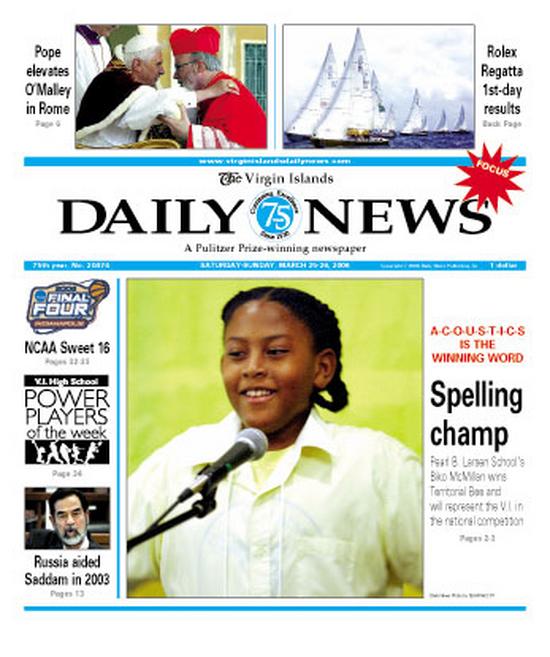|
|
Rest in (underwater) Peace Artificial sea habitats offer an opportunity for loved ones to 'live on' through sea life By LYNN FREEHILL Monday, March 20th 2006 St. Thomas could get an official underwater graveyard of sorts if a permit to place artificial "eternal reef balls" off its shores is approved. The perforated hollow balls, which already have been set along the coastlines of Florida, Texas, New Jersey and other states, are made of concrete, with the ashes of cremated bodies mixed in. Such balls allow loved ones to "live on" as their remains become part of a structure that shelters fish and provides coral and algae a place to flourish, according to Dependable Maritime Services co-owner Harry Freyn, who proposed the project. "It's a unique alternative to scattering ashes," he said. "You can never go back to those, but it's comforting to return to the reef ball and see sea life on it." Freyn, whose company provides line-handling services for cruise ships and other passenger vessels at Crown Bay, has applied for a major water permit from the V.I. Department of Planning and Natural Resources' Division of Coastal Zone Management to place reef balls in three locations around the island. The company would set up to 12 balls at Brewers Bay, 12 at Coki Point and 38 near Inner Brass cay off the St. Thomas's North Side, according to the application. The reef balls at Brewers Bay hopefully would allow for future research by the nearby University of the Virgin Islands, and at Coki Point it would draw more marine life for snorkelers and divers to enjoy, Freyn said. Only those at Inner Brass, which is "far enough from the hustle-bustle" to provide a peaceful final resting place, would include ashes. After a friend who wanted to be buried at sea died in 2004, Freyn and business partner Edward Pierce stumbled upon information about Atlanta-based Eternal Reefs Inc., which developed the memorial reef concept in 1998. With increasing numbers of people opting for cremation, the two men saw an opportunity, Freyn said. In 2003, 28 percent of U.S. deaths were cremations, and by 2025, 45 percent will be, according to research and projections from the Cremation Association of North America. Reef balls cost about $600 each to produce, but the fiberglass molds from which they are made cost around $5,000, Freyn said. The company has not set rates for the reef balls but expects to charge several thousand dollars - making the option pricier than scattering ashes but cheaper than holding a funeral. Environmental impacts For an extra fee, families can choose to have a memorial plaque placed on the ball, he said. The V.I. Division of Fish and Wildlife already has three artificial reef sites in territorial waters, Director Barbara Kojis said, but they are composed of metal-hulled and fiberglass vessels and concrete pieces and are in water depths of between 90 and 120 feet. Kojis said she believes that concrete reef balls could benefit the environment if they were thoughtfully placed. The division's artificial reef sites are away from natural coral and along sandy ocean bottom. "In siting these you have to be very careful, because they have the potential to move in storms," she said. "But balls like these in major storms, from what I've heard, haven't moved much." The reef balls Freyn has proposed would stand between 3- and 4-feet tall and extend up to six feet in diameter, he said, and weigh up to 1,200 pounds. They would be towed behind boats to their locations in water depths of up to 45 feet. "There's a lot of scientific stuff that goes into it - it's not a clump of concrete," he said. Richard Nemeth, director of UVI's Center for Marine and Environmental Studies, has expressed support for Freyn's reef ball project. "Reef balls are an effective way of mitigating the damage that coral reefs have sustained from years of human impacts of natural disturbances," Nemeth said in an endorsement letter to CZM. Coral reefs in Brewers Bay were crippled by excess sedimentation during the construction of the King Airport runway, he said, and placing reef balls in the area might aid their recovery and provide research opportunities for UVI students and faculty. For the project to be approved, the permit application must be presented at a public hearing, reviewed by staff and voted upon by the CZM Commission, CZM attorney Jennifer Jones said. If the project goes through, Freyn will accomplish a personal goal as well as a business one: He hopes to put the ashes of his mother, who died in 2004, into one of the first eternal reef balls he produces. "She loved the islands, and she'll be so happy to be a reef ball," he said. People have said it sounds ghoulish, but I feel it's a beautiful thing. If I can do it, that's where I would be." - Contact Lynn Freehill at 774-8772 ext. 311 or e-mail lfreehill@dailynews.vi. |
| Home | My
VI Daily News | Business
| Sports
| Features
| Editorial
Opinion Obituaries | Records | Local Calendar | Online Media Kit Print Advertising | Contact us | Terms of use | Need Help?
© 2005, Virgin Islands Daily News
Powered by CPSG Software Inc. |
|
| ||
|
| ||
|
| ||
|
| ||
|
| ||
|
| ||
|
| ||
|
| ||
|
| ||
|
| ||
|
| ||
|
| ||
|
| ||
|
| ||
|
|
